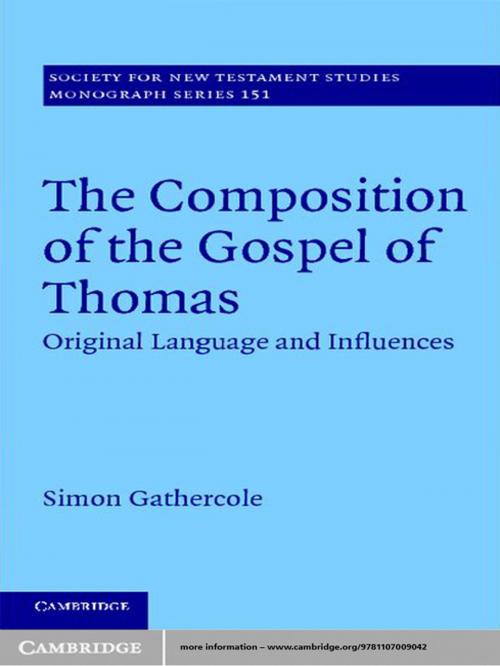The Composition of the Gospel of Thomas
Original Language and Influences
Nonfiction, Religion & Spirituality, Bible & Bible Studies, New Testament, Study, Fiction & Literature, Literary Theory & Criticism| Author: | Simon Gathercole | ISBN: | 9781139334235 |
| Publisher: | Cambridge University Press | Publication: | March 1, 2012 |
| Imprint: | Cambridge University Press | Language: | English |
| Author: | Simon Gathercole |
| ISBN: | 9781139334235 |
| Publisher: | Cambridge University Press |
| Publication: | March 1, 2012 |
| Imprint: | Cambridge University Press |
| Language: | English |
This book addresses two central questions in current research on the Gospel of Thomas: what was its original language and which early Christian works influenced it? At present, theories of Thomas as a Semitic work abound. Simon Gathercole dismantles these approaches, arguing instead that Thomas is Greek literature and that the matter of Thomas's original language is connected with an even more controverted question: that of the relationship between Thomas and the canonical New Testament. Rather than being independent of Matthew, Mark and Luke (as in most Western Aramaic theories of Thomas) or thoroughly dependent on the four gospels (as in most Syriac approaches), Gathercole develops a newly refined approach to how Thomas is influenced by the Synoptic Gospels. Thomas can be seen to refer to Matthew as a gospel writer, and evidence is discussed showing that Thomas incorporates phraseology distinctive to Luke, while also extending that special Lukan language.
This book addresses two central questions in current research on the Gospel of Thomas: what was its original language and which early Christian works influenced it? At present, theories of Thomas as a Semitic work abound. Simon Gathercole dismantles these approaches, arguing instead that Thomas is Greek literature and that the matter of Thomas's original language is connected with an even more controverted question: that of the relationship between Thomas and the canonical New Testament. Rather than being independent of Matthew, Mark and Luke (as in most Western Aramaic theories of Thomas) or thoroughly dependent on the four gospels (as in most Syriac approaches), Gathercole develops a newly refined approach to how Thomas is influenced by the Synoptic Gospels. Thomas can be seen to refer to Matthew as a gospel writer, and evidence is discussed showing that Thomas incorporates phraseology distinctive to Luke, while also extending that special Lukan language.















